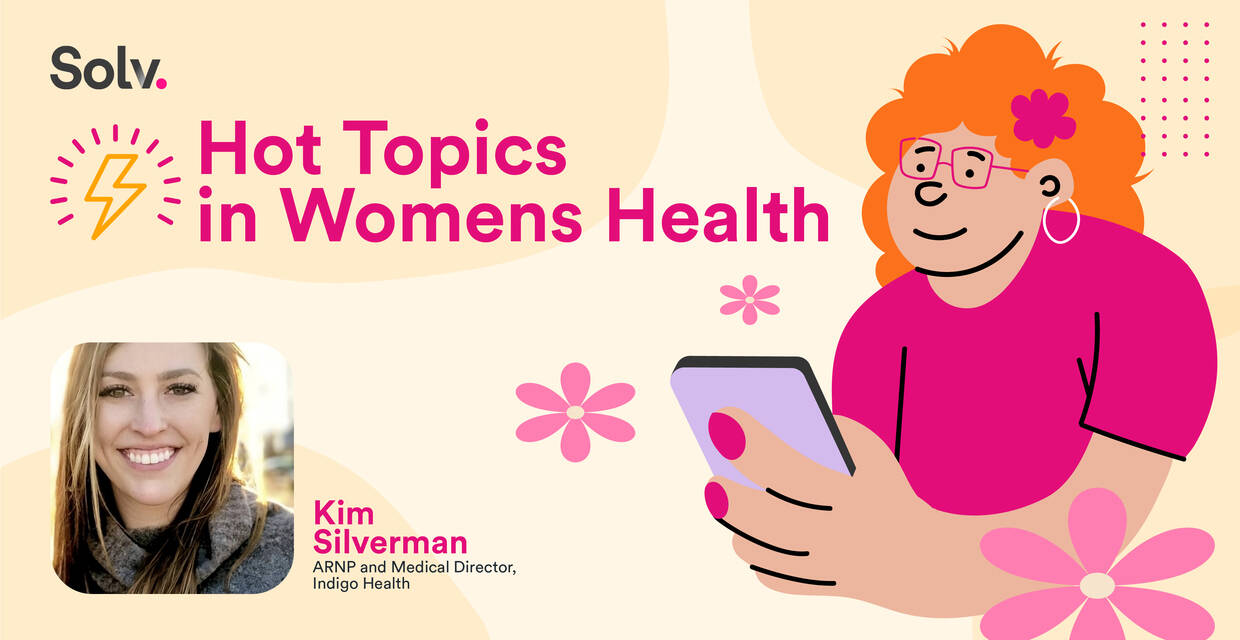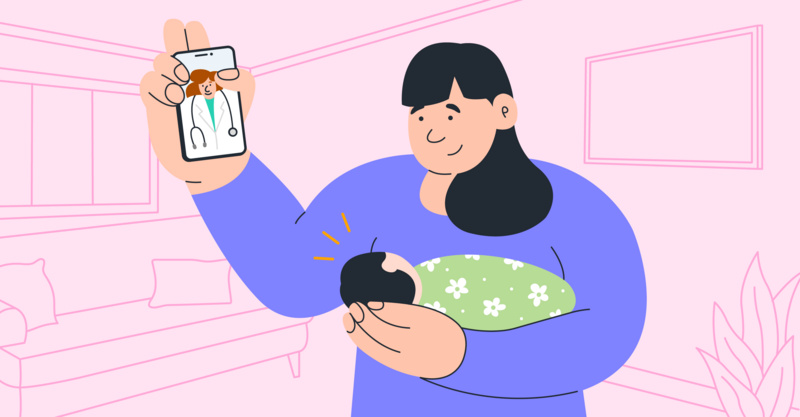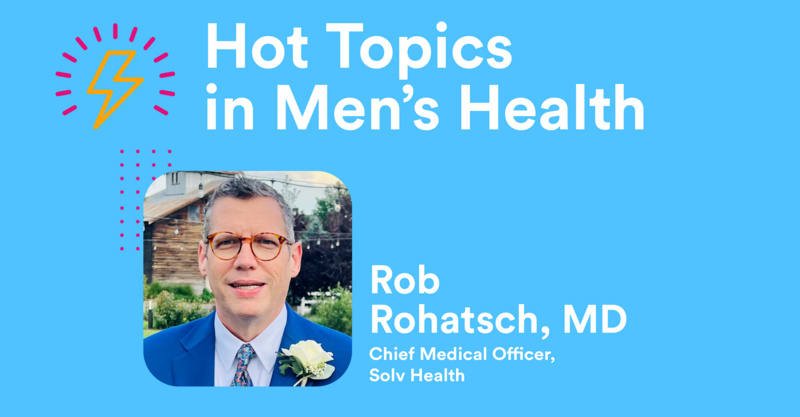Women’s health is complex. Not only are women more at risk for certain health conditions like heart disease and stroke, but they also are at risk for gender-specific conditions like cervical cancer and endometriosis. Recommendations on which exams and testing women should get change every few years, so in honor of Women’s Health Month, we interviewed Kim Silverman, ARNP, Medical Director from Indigo Urgent Care in Washington to help shed light on what is important for women to know about their healthcare—and for her take on hot topics in women’s health.
Solv: Thanks for chatting with us today! I’d love to start off with you just giving us a general overview of what kind of exams women should get as they age. We know it changes quite a bit as we age, so let’s break it down. What should women in their 20s consider for annual exams and routine testing?
Kim Silverman, ARNP: Sure! Thanks for having me! So jumping right into it—in your 20s, anyone with a cervix should start getting pap smears at age 21. That will look for precancerous cells on the cervix that might become cervical cancer. Also, at these appointments, they typically do a lot more—like taking your vital signs, measuring blood pressure, and testing for diabetes, high cholesterol, and thyroid disorders. And maybe some STI testing! They’ll also take a detailed history to figure out what your risk factors are, and what your family history is—that will help decide what testing is best for you.
Solv: That is super helpful! How do things change for women in their 30s?
Kim Silverman, ARNP: Going into your 30s, they may add an additional test called an HPV test. HPV is the human papillomavirus that causes cell changes in the cervix. This is a test you should get every five years, depending on the result.
Solv: How about women in their 40s? What do they need to know about annual exams?
Kim Silverman, ARNP: When you get into your 40s, one of the things that get added is your biennial mammograms. Women in their 40s should still get a yearly annual exam with a primary care provider, as far as lab work and making sure everything is going all right. But they also recommend a mammogram every other year, starting in your 40s.
Solv: On that note, what is the average age women start menopause? And how does that change what kind of annual testing they should get?
Kim Silverman, ARNP: Menopause typically happens in your 40s and 50s. In the US, the average age is 51 years old. Typically, it can cause symptoms like hot flashes, emotional symptoms, maybe you're not sleeping well and have lower energy. These are really important discussions to have with your primary care provider or your gynecologist because there's specific lab work they may do or specific treatments to help manage your symptoms when you're experiencing menopause.
Solv: That’s great! What do you think is the best way a woman can be empowered when it comes to taking care of her health?
Kim Silverman, ARNP: So as a provider, something that women can do to be empowered is establishing care with a primary care provider. Establishing a relationship with an OB-GYN is also a great option.
Solv: Establishing care with a primary provider is super important! But we know that life gets hectic—so what can things like telehealth and urgent care help with in regard to women’s health?
Kim Silverman, ARNP: For telehealth, we treat many things—such as UTIs, yeast infections, STI treatment, and even prescribing certain kinds of contraceptives like oral contraceptives. Some telehealth providers have the ability to refer you to a laboratory to check your thyroid, your blood sugar, or other lab work. Urgent care can do everything telehealth can do, however, they also have the ability to do pelvic exams if needed, a breast exam if you're concerned about a lump, and lab work or imaging as well!
Solv: When should a woman need to seek care in an emergency room?
Kim Silverman, ARNP: Oftentimes, women's health issues can be addressed by their primary care provider, OB-GYN, telehealth, or urgent care. However, there may be times when it is appropriate to seek care in the emergency department—such as in the case of severe pelvic pain, or severe vaginal bleeding. The most important thing to do is to reach out to someone, whether that's calling a nurse hotline, making an appointment with telehealth, or urgent care. They will direct you to a higher level of care if needed.
Solv: How should women decide whether urgent care or telehealth is the correct choice vs. waiting for an appointment with a PCP?
Kim Silverman, ARNP: For yearly annual checkups, the best place is going to be your primary care provider or OB-GYN—they're going to already know you, your medical history, and your family history. And they'll have all the testing and diagnostic resources that are needed, for example, pap smears or orders for mammography. For anything else that comes up along the way, urgent care or telehealth are great options! These are great if you get a UTI or a yeast infection, or maybe were exposed to an STI. That way you're not waiting a really long time but for anything routine go to your regular primary care provider OB-GYN if you can.
Solv: Can we talk about some of the common chronic conditions women face? Like, what are the differences between endometriosis and PCOS?
Kim Silverman, ARNP: Endometriosis is a condition where tissue that resembles the lining of the uterus grows outside of the uterine cavity—typically growing on the ovaries, bowels, and other structures in the pelvis. PCOS is a condition that affects the female hormone levels. Typically there's a higher level of androgens, otherwise known as male hormones, and this can interfere with ovulation and can cause excess hair growth, acne, insulin resistance, and weight gain. There are certain lab tests that may be done with certain imaging to be able to diagnose these and to properly treat you.
Solv: What symptoms should women look out for in PCOS and endometriosis?
Kim Silverman, ARNP: These are both common among females of reproductive age, and they can cause a host of symptoms—such as painful and irregular periods, excessive bleeding, increased acne, increased hair growth where you don't want it, and thinning of the hair. So it's really important if you start experiencing anything to follow up with your healthcare provider and have these discussions with them.
Solv: So, as a medical director for busy urgent care—what are the most common problems that women come to urgent care for?
Kim Silverman, ARNP: UTIs are one of the most common! It's our bread and butter at urgent care. We see that everyday—all day. If you have ever had a UTI before you know that they can be quite painful, and if left untreated, they can also progress into a kidney infection, so it’s really important for you to come on in and be seen. Usually, when we see people for UTIs we can also assess if there is anything else going on. Should we just check you for sexually transmitted infections? Do you have a yeast infection? We all know how common that is! Those are questions we would ask you during your visit, so we can take care of you.
Solv: What is a hot topic when it comes to women’s health?
Kim Silverman, ARNP: It's sexually transmitted infections! They are a very common reason that we see patients in telehealth and in the urgent care setting. Whether you are exposed, or you think you could have been exposed, or you just want to go ahead and get checked—that is something that is super common and relatively easy to do. We can do urine testing, vaginal swabs, or blood testing. We'll also have a discussion to figure out what you need to be tested for and if you need treatment. It’s a super easy visit.
Solv: Last question—What is the big takeaway here for women’s health?
Kim Silverman, ARNP: So as a provider, one of the most important things for all age groups would be eating a balanced diet, getting good sleep, and regular exercise. Another thing is to establish care with a primary care provider because they will be able to guide you through everything you need every year.
Need care now? Solv can help you find and book visits with top-rated urgent care clinics near you.
Source:
- Five Conditions That Affect Women More Than Men. (May 18, 2023)
https://www.bannerhealth.com/healthcareblog/teach-me/medical-conditions-that-impact-women-more-than-men



 LinkedIn
LinkedIn








